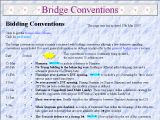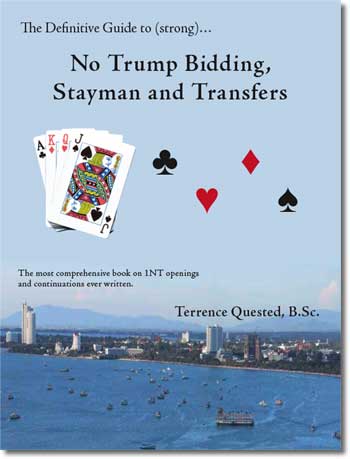Mon 12th N-S 1st Jean &
E-W 1st
Hans & Janne 70% 2nd Gene &
Wed 14th N-S 1st Bob S & Johan 62% 2nd
E-W 1st Fjacce & Joello 68% 2nd
Fri 16th 1st
| to news-sheet main page |
 |
 |
|||
| to Pattaya Bridge home page |
|||||
 |
to bridge book reviews | to bridge conventions | to No Trump bidding | ||
| to bridge CD's and computer games and software | |||||
Bidding Quiz Standard
American bidding is assumed unless otherwise stated.
♠
10 ♠ -
♥ Q852 ♥
KQJ9 With Hand B partner opens 1♥, what do you bid?
♦ AQ3 ♦ 7542
♣ K9865 ♣ KQ1052
♠ 7 ♠
AQJ8
♥
AQ643 ♥ K102 What
do you open with Hand D?
♦ A852 ♦ AJ8
♣ A76 ♣
854
what do you bid?
♠ AKQ5 ♠
AJ985
♥
KJ9743 ♥ A10762 With Hand F you ‘accidentally’ open 1♥ - presumably
you
♦ 4 ♦ 83 had a ♠ mixed up with the ♣’s. Anyway, you open 1♥ and
♣ J10 ♣ A partner
splinters with 3♠, what do you bid?
Hand G Hand H With Hand G
everybody is vulnerable. Partner
opens 1♥ and
♠
AQ1043 ♠
AJ1098432
♥ 102 ♥ QJ65
♦ K4 ♦ 4 What do you open with Hand H?
♣ Q1052 ♣ -
Bidding Sequence Quiz
J 1♥ pass 1♠ pass How
many ♠’s should the 2♠ bidder have?
K 1♥ pass 1♠ pass How
many ♠’s should the 2♠ bidder have?
2♣ pass 2♠
A few of the club’s less
experienced players are gradually getting used to splinters (two examples
occured on Monday). But having got the hang of splinters, it’s necessary to
know what to do next!
After a
Splinter – part 1 Board 27 from Monday 12th
Dealer: ♠
10 Table
A
South ♥ Q852 West North(A) East South(E)
Love all ♦ AQ3 - - - 1♥
♣ K9865 pass 3♠ (1) pass 4♠ (2)
pass 5♥ pass 6♥
♠ J8732 N ♠ 964
all pass
♥ 10 W E ♥ A6
♣
A7432 ♣ Q West North(A) East South(E)
♠ AKQ5 - - - 1♥
♥
KJ9743 pass 3♠ (1) pass 4♥ (2)
♦ 4 all pass
♣ J10
And what happened? Three pairs all went down in
slam. Only two pairs found the optimum contract of 4♥.
The bottom lines: -
- If
partner splinters, then your hand improves if you have xxx or Axx etc. in the
splinter suit but if you hold something like KQx or AKQ then your hand goes
downhill and you should sign off without significant extra values.
After a
Splinter – part 2 Board 5 from Monday 12th
Dealer: ♠
AJ985 Table
A
North ♥ A10762 West North(F) East South(B)
N-S vul ♦ 83 - 1♥ (1) pass 3♠ (2)
♣ A pass 4NT (3) pass 5♦ (4)
pass 5♥ pass 6♥ (5)
♠ KQ763 N ♠ 1042
all pass
♥ 84 W E ♥ 53
♣
J76 ♣ 9843 West North(F) East South(B)
♠ - - 1♥ (1) pass 3♠ (2)
♥
KQJ9 pass 4♣ (6) pass 4♠ (7)
♦ 7542 pass 5♥ (8) all pass
♣ KQ1052
And what happened? 6♥ rather luckily made +1 when East did not find
a ♦ lead. The rest of the field
were in 4♥ or 5♥
making anything from +1 to +3.
The bottom lines: -
- If
partner splinters and you want to continue, then cue bid if you hand is not
suitable for RKCB.
A Defence problem Board
20 from Monday 12th
♣
753
♠ K107 You are West, defending 3NT. Partner leads the ♠4 and
♥
K92 dummy plays the ♠10. You win with the ♠A, declarer
♦ 76 playing
the ♠2. What do you lead to t
♣ QJ984
Dealer: ♠ 62 West North East South
North ♥ AQJ6 pass 1NT pass 3NT
E-W vul ♦ AJ102 all pass
♣ K62
♣
753 ♣ A10 playing
the ♠2. How should West continue?
♠ K107
♥
K92 I saw three West’s switch to the ♦4, what do you think
of
♦ 76 this play? Not much! Even if West can set up ♦’s, he has no
♣ QJ984 entry. No, the answer lies in the ♠ suit and specifically dummy’s play of the ♠10. That marks partner with the ♠QJ! For if declarer had either of these cards
he would not have played the ♠10 at t
And what happened? The three declarers who received a ♦ switch all
made the contract +1 (up with the ♦A and play ♣’s – thus scoring 1 ♠, 4 ♥’s, 1♦ and 4 ♣’s). Other results were the usual spurious ones,
with many not in game.
North South West North East South
♠
Q106 ♠ A83 - - - 2♣
♥ AKQ42 ♥
- pass 2♥ pass 3♦
♦ 87 ♦ AKQJ1065 pass 3♥ pass 6♦
♣ 864 ♣ AK3 all pass
You are South,
declarer in 6♦. West leads the ♣Q. When you bid 6♦ you knew that there
may be entry problems to dummy – and there are. Or are there? Plan the play.
Dave’s Column
answer Board 14 from Wednesday 14th
Dealer: ♠ Q106 West North East South
East ♥ AKQ42 - - - 2♣
Love all ♦ 87 pass 2♥ pass 3♦
♣ 864 pass 3♥ pass 6♦
all pass
♣
QJ107 ♣ 952
♠ A83
♥
-
♦ AKQJ1065
♣ AK3
One line of play to get to dummy’s lovely ♥’s is to lead a low ♠ and hope that West has the ♠K. Of course if you pull one round of trumps and the ♦9 is singleton, then the ♦8 is an entry. But why take these guesses when you have a 100% entry to dummy?
Lead a low ♦ at t
Incidentally, you would play 6NT the same way on the ♣Q lead and that actually is a better contract as it makes when there is a bad ♥ split with ♦’s 3-1 or 4-0.
And what happened at the Pattaya Bridge Club? I don’t know if declarers found this ♦ play, but 6♦ made twice and 6NT made once. 7NT was bid twice and went down and there
were a couple of pairs in 3NT.
Dave’s 2nd
Column Here
is Dave’s 2nd input involving a defensive problem.
♠
KQJ N
♥ AJ10932 W E West North East South
♣
2 4♣ pass 4NT pass
♠ 432 7NT all pass
♥
Q65
♦ 109 You
are South, on lead against 7NT.
♣ 107653 Hoping to find a
safe lead, you choose the ♦10.
Declarer takes three t
What do you discard (it looks like partner has
5 ♦’s)
Dave’s 2nd
Column answer Board 13 from Wednesday 14th
Dealer: ♠ 8765 West North East South
North ♥ 4 - pass 2NT pass
Both vul ♦ J7654 4♣ (1) pass 4NT (2) pass
♣ 984 7NT all pass
♠
KQJ N ♠
A109 (1) Gerber
♥ AJ10932 W E ♥ K87 (2) 3 aces
♣
2 ♣ AKQJ You
are South and lead the ♦10. Declarer cashes
♠ 432 three rounds of ♦’s, ending in dummy.
♥
Q65 What do you discard?
♦ 109
♣ 107653
Declarer has to find the ♥Q to make his grand slam. Notice what happens
if you (South) discard the useless ♠2.
Declarer takes his black suit t
Go back and throw a ♣ at t
The bottom line: -
- Jean Besse’s
quote from his 1994 Bols bridge tip: “Don’t play an idle card thoughtlessly.
If played at the wrong time, an idle card may betray your whole hand”
Playing Negative Doubles Board
13 from Monday 12th
Dealer: ♠
AQ1043 Table
A
North ♥ 102 West North(G) East South(C)
Both vul ♦ K4 - pass (1) pass 1♥
♣ Q1052 1♠ pass (2) pass 2♦ (3)
pass 2NT all
pass 6♥
♠ KJ982 N ♠ 65
♥ KJ5 W E ♥ 987 ‘Expert’ Table
♣
K63 ♣
984 - pass (1) pass 1♥
♠ 7 1♠ pass (2) pass
♥
AQ643 all pass
♦ A852
♣ A76
And what happened? 2NT made +1 for an OK score,
but 1100 would have been nicer. As no E-W pair were
doubled in anything then I suspect that North opened at most tables. 3NT was a
popular contract; it made twice and went -1 three times
The bottom lines: -
-
With
vulnerable opponents, it’s usually best to take the vulnerable penalty rather
than bid a risky 3NT.
-
If you play Negative Doubles,
then you have to re-open double with a double at (3) with most hands or you
will miss penalties. If you disagree and think that 2♦ is fine, then excavate
a stone-age book and do not play negative doubles.
-
The (few) exceptions when
you should not re-open with a double are given on the website.
That
infamous 4333 type shape again Board 30 from
Wednesday 14th
Dealer: ♠
96 Table
A
East ♥ 963 West North East(D) South
Love all ♦ Q1032 - - 1NT (1) pass
♣ A1097 2♣ (2) pass 2♠ pass
♠ 1042 N ♠ AQJ8
2NT all
pass
♥ AQJ5 W E ♥ K102
♣
J3 ♣
854 West North East(D) South
♠ K753 - - 1♣ (1) pass
♥
874 1♥ pass 1♠ pass
♦ K4 1NT all
pass
♣ KQ62
And what happened? Two players bid as table B
and both made +1 due to inaccurate defence. Everybody else overbid to 2NT and
three out of six went one down.
The bottom lines: -
Better
Minor? Board
30 from Wednesday 14th
Hand H What did you open
with this North hand H in this week’s quiz?
♠
AJ1098432 4♠ looks pretty
automatic to me, and this is yet another example
♥ QJ65 of why I like to play Namyats. 4♠ shows a weak hand and does
♦ 4 not invite partner to go looking for slam.
♣ - But what does
this have to do with Better Minor? One player did actually open 1♦, in the belief that
that was OK as it is the better of the minors!
That is totally
unacceptable of course, an opening 1♣/♦ bid must be
at least three cards when playing better minor. Two or less and it’s a psyche.
Hand L Hand M That brings me on to this hand
L (North hand 9 from Wednesday).
♠
A65 ♠
A65 I was
asked if a 1♦ opening was acceptable. Now the hand does
♥ AQ87 ♥ AQ87 have 3 ♦’s but 1♦ is not
acceptable in my view – it has no
♦ 953 ♦ AJ9 advantage over 1♣ except to deceive partner/the opponents and
♣ AJ9 ♣ 953 is clearly semi-psychic in nature (inhibit a ♦
lead).
Hand M is different however,
it is very similar to Hand D from the previous page. When 3-3 in the minors
most experts agree that you should open 1♣, although a
1♦ opening would be acceptable because this is clearly the better of the
two minors and is not semi-psychic.
Hand N Hand P But when 4-4 in the minors things are different. Some
experts
♠
A5 ♠
A5 always
open 1♦, some always open 1♣, and some open the
♥ AQ8 ♥ AQ8 better. I personally always open 1♣ when 4-4 and would open
♦ 9753 ♦ AJ96 1♣ with both of these
hands but I have no problem with 1♦
♣ AJ96 ♣ 9753 with either
if that is your style.
Hand A: 3♠,
a splinter agreeing ♥’s and showing ♠ shortage.
Hand C: Dbl. automatic. Where are the points and where
are the ♠’s? The answer is – with partner. He is sitting
there with around 8-11 points and a ♠
stack just waiting for you to double. The fact that partner is a passed hand is
virtually irrelevant and you should double with this hand whatever. Note that I
said ‘virtually irrelevant’, the fact that partner is a passed hand in fact
makes it less likely that you have a vulnerable game and so you should be even
more inclined to go for the vulnerable penalty.
Hand D: 1♣ (or 1♦ if you prefer). Knock off a point for the 4333
shape and the hand is not worth a 1NT opener.
Hand E: 4♥.
Your hand was great but ♠ shortage opposite
is of no use whatsoever, so sign off in game.
Hand F: 4♣,
a cue bid. Do not bid RKC Blackwood with a wide open suit (♦’s). Pass is the reasonable alternative if you
don’t want to look for slam.
Hand G: Pass, and pass partner’s subsequent automatic re-opening
double (assuming that you play Negative Doubles).
Hand H: 4♠.
Pass is the only other option but 4♠
seems very clear to me. Note that this is an exception to the philosophy of not
pre-empting with a 4-card major. You are already in game and if partner has ♥’s it’s probably still better to play in ♠’s with this hand.
Bidding Sequence Answers
J 1♥ pass 1♠ pass Responder
promises only 5 ♠’s for this sequence, the reason
K 1♥ pass 1♠ pass But
things are different here. Opener has shown two suits and
2♣ pass 2♠ is likely to be short in ♠’s. This 2♠
bid promises 6 ♠’s.

